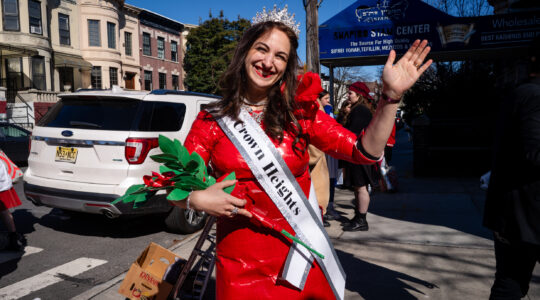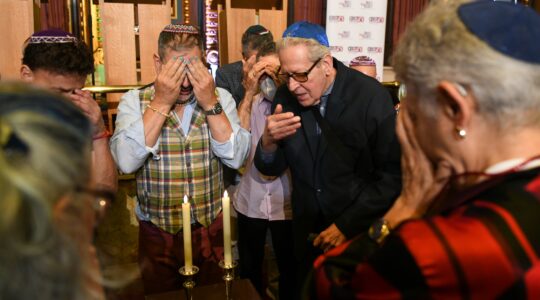Christmas is coming, and it’s time for Gerta Grunen to dust off her dreidels and warm up her vocal cords.
The dreidels decorate a miniature evergreen, topped by a miniature bagel: a prop Grunen uses when telling audiences her tale of growing up Jewish in Portland, Ore. A bubbly entertainer with a physical resemblance to Judy Garland, Grunen is performing her semi-annual "Jewish Girl’s Christmas" this month at Danny’s Skylight Room, one of the city’s remaining venues dedicated to the intimate art of cabaret.
"It’s a loving story about being a Jew and loving your heritage," Grunen says of her show of songs and soliloquies (what she calls "kooky stories" about how "people deal with being Jewish at Christmas time") ornamented with a Chanukah medley and a bit of holiday history. "It’s kind of like Judaism 101," Grunen says in an airy voice that seems spiked with helium.
With its small-scale performance settings and emphasis on lyrics, rather than vocal acrobatics, cabaret is a storyteller’s medium. To the uninitiated, the term "cabaret" may bring to mind the titillating Teutons of John Kander and Fred Ebb’s musical about Weimar-era decadence in Berlin. But for devotees of the art form, cabaret offers a platform for baring souls, not legs.
"You’re not telling lines to a big house," Grunen says. "You see the people and have to relate to your audience. There is no fourth wall in cabaret," she adds, referring to the invisible barrier said to separate stage actors from audiences. "Many, many people do this because they love being able to create that kind of atmosphere with people."
The vogue today in cabaret is creating themed shows that explore an overarching idea, salute favorite singers and cherished composers, or highlight the performer’s own biographical quirks. Andrea Marcovicci, for example, returned this month to the Algonquin Hotel’s Oak Room for an eight-week tribute to Cole Porter. Other artists recently have devoted their shows to such specialized topics as Hollywood film songs of the ’40s and ’50s or music made famous by Frank Sinatra. Grunen, who’s been singing cabaret regularly for 20 years, is one of a handful of performers who use their time in the spotlight to tell distinctly Jewish stories.
Along with "A Jewish Girl’s Christmas," audiences this month can catch a performance by Natalie Gamsu at Don’t Tell Mama. The singer, who grew up in the small Jewish community of Windhoek, Namibia, takes up the theme of social justice in her work and included a hypnotic version of the traditional Hebrew love song "Et Dodim" on her first CD release, "Weave."
Patrons who act quickly also can hear Mark Nadler sing in a one-night-only star-studded salute to composer Richard Rodgers at Queens Community College. Nadler last wowed New York audiences in October with a show that included comic riffs on his background as an awkward and unhappy Jewish kid in Waterloo, Iowa.
Perhaps it’s no coincidence that many of these vocally Jewish artists hail from places with sparse Jewish populations. In those outposts, ethnicity and religion set the future performers apart from the crowd and fostered a self-reflective perspective.
Iowa is known as "the pork state," after all. "Not great when you’re Jewish," says Nadler, who says he paid his way to music school in Michigan by singing at Waterloo’s Long Straw Saloon.
Nadler entitled his recent act "Tchaikovsky (and Other Russians)," after the song by Kurt Weill and Ira Gershwin that launched Danny Kaye to stardom. Nadler deconstructed the song (basically a list of 48 composers’ names) as a way to speak about the individuals and to make some personal connections.
"I talked about the fact that some of these guys were Jewish and living in Russia in the 19th century," Nadler told The Jewish Week by telephone. "That’s similar to Iowa in many ways."
Gamsu (who was featured in the 2001 documentary "Showbiz Is My Life" along with cabaret greats Julie Wilson and Baby Jane Dexter) says her act is shaped by the multiple strands of her unusual background: synagogue services, radio broadcasts, English school, and African caregivers.
"In a way, it took leaving South Africa and coming to America to look at what the different influences were that have shaped me and what are the stories I want to tell," Gamsu told The Jewish Week. About seven years ago while performing at the downtown club Fez, Gamsu says she began to talk about her great-grandparents and their emigration from Latvia and Lithuania to southern Africa.
"Cabaret is so personal," she says. "To find myself here, I had to trace my roots back."
Historians trace cabaret’s roots back to 1880s Paris, where it was born in the nightclubs of the Montmarte artists’ quarter. The popular performance style spread to other cities in France and filtered into the smoky, sexy haze of clubs in Germany.
In the United States, cabaret was fueled by Prohibition in the 1920s. Underground "speakeasies" offered patrons bootleg booze; entertainers provided an air of legitimacy and a reason to order another round. When liquor became legal again in 1933, supper clubs in New York sprouted along with more lavish nightclubs. Eventually, rock and roll captured younger audiences and, later, AIDS took its toll on the cabaret scene.
For decades, however, cabaret venues such as CafÈ Society, the Vanguard and the Duplex have been the proving grounds for future singing stars like Billie Holiday, Eartha Kitt, Kaye Ballard, Barbra Streisand and Bette Midler, and comedians Woody Allen and Joan Rivers.
Today, many in the business say, chances for stardom are small and making a living is next to impossible. Performers often must pay out their own pockets for rehearsal time, press tickets, lighting and musicians.
"Basically as an artist, you’re producing all your own work and supporting as many people as you can," says Gamsu, who works part-time at Columbia University and in a lingerie shop in Soho. Despite strong reviews and an invitation to sing at opening night of this year’s Cabaret Convention, at which she shared the bill with Marcovicci and Tovah Feldshuh, Gamsu says she’s not sure she how long she can stay in the game.
Others wonder if cabaret can attract fresh audiences. "Most people think of it as an older person’s form of entertainment," says cabaret critic Mark Finkle. But the form is very current and "very much alive," he says.
Finkle points to the work of younger performers and contemporary songwriters as keeping cabaret vital. Among them is Francesca Blumenthal, best known for her song "The Lies of Handsome Men," who says her songs subtly reflect her growing up in a Jewish neighborhood in Brooklyn and her life in Queens "where I spent too many years." There’s also Steven Lutvak, known for his comic song, "The Dinner Party" (or, "Bagel maker to the Tsars") about his family’s Russian-Jewish roots.
While very little about cabaret is overtly Jewish (think Irving Berlin and "White Christmas") some people do recognize an identifiable Jewish trope. "Cabaret is sort of the last bastion of perpetuating a Jewish sensibility when it’s in something of an assimilationist mode," Finkle says.
While working on "Tchaikovsky," Mark Nadler says he realized that without the European Jewish composers and their successors in America (Weill, George and Ira Gershwin, Richard Rodgers) "we wouldn’t have musical theater."
"The history of musical theater and the songs we now call cabaret music," Nadler says, "it’s a Jewish history, and it’s a good one."
Mark Nadler performs with KT Sullivan, Heather Mac Rae and Craig Rubano in "Something Wonderful," a tribute to Richard Rodgers at Queens Community College, 222-05 56th Ave., Bayside, Queens. (718) 631-6311. Sunday, Dec. 1, 3 p.m. $35-$29. Gerta Grunen sings at Danny’s Skylight Room, 346 W. 46th St., Manhattan (212) 265-8133. Sun., Dec. 1, 8 and 15; all shows 4 p.m.; $12, plus $10 food/drink minimum. Natalie Gamzu appears at Don’t Tell Mama, 343 W. 46th St., Manhattan, (212) 757-0788. Tues., Dec. 3, 10 and 17; Mon., Dec. 9; all shows 6:30 p.m. $15, with two-drink minimum. Andrea Marcovicci performs through Jan.11 at the Oak Room, Algonquin Hotel, 59 W. 44th St., Manhattan, (212) 840-6800. $50 cover.
The New York Jewish Week brings you the stories behind the headlines, keeping you connected to Jewish life in New York. Help sustain the reporting you trust by donating today.




